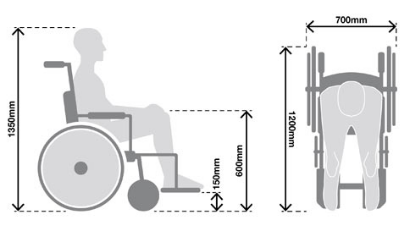Most event planners will want whatever occasion they plan to be inclusive. But there’s also important legislation which businesses have to comply with.
The UK Equality Act 2010 requires all events – including things like conferences and exhibitions – to be accessible and inclusive. As an organisation that puts on an event, you have to take reasonable steps to find out whether someone is disabled.
As an event planner, you can have more of an impact than you realise. Of course, it’s important to know your legal responsibilities, but there are loads of reasons to promote inclusiveness when organising an event.
You want people to attend and enjoy themselves. For people with a disability, it can be difficult to find accessible events. Be sure to share your efforts in making yours an accessible one for a wider audience.
With 15% of the world’s population having some form of disability, it’s important to create experiences with accessibility in mind. That’s over a billion people who might have limited access to events if people don’t consider inclusivity.
In the UK, the 2018 Papworth Trust report discovered 22% of disabled adults report having little choice over their free time. Many people have difficulties accessing services in towns – especially for leisure. This leaves them feeling like they don’t have enough choice or control over what they can do.
In fact, 75% of disabled people have had to leave a shop or business due to the lack of understanding or awareness of their needs. You don’t want people to be unable to attend your event because of a lack of planning.
Common barriers to accessibility identified in the Papworth Trust report include:
- Inadequate lifts or escalators and handrails
- Lack of ramps
- Parking Problems
- Footpath design
With the right planning, you can ensure more people can attend your event. Of course, not every event can be fully accessible, but you’ll notice the benefits if you make reasonable adjustments, remove barriers to movement and inform your audience about the venue and what to expect.
Some of the easy, low-cost ways to start improving accessibility:
- Clearing clutter from corridors and aisles
- Printing menus, leaflets and brochures in at least 12-point font (14 point is ideal) and being prepared to do larger print if requested
- Training staff so they are confident in offering assistance when requested, for example, reading a menu out loud or writing down a price
- Provide parking for disabled customers or make sure staff know where the nearest suitable parking is located
Disabilities are diverse. Accessibility requirements vary, and will also depend on what type of event you’re putting on. You might come across the following accessibility measures while you’re researching:
Wheelchair access
Door and hallways need to accommodate the width of a standard wheelchair (70cm). If you need to go up or down stairs, there should be a lift available.
Accessible toilets
Wheelchair-accessible toilets need to have room for turning space, so there can’t be unnecessary clutter. There needs to be grab rails and a lowered sink too.
Hearing / induction loop
Used by people who have hearing impairments, this sound system can produce an electromagnetic signal received directly by hearing aids.
Captioning
Usually presented as subtitles on a screen, it’s important to have text to represent anything spoken.
Audio description
For blind and visually impaired attendees, you can have a narrator to talk through a performance, tour, workshop or demonstration. This is often pre-recorded so it can be played through headphones in real time.
Signed performance
For some events, it might be necessary to hire a trained British Sign Language (BSL) interpreter is present the language used at the same time. They usually stand to one side of the stage.
Relaxed performance
During relaxed performances, lights might be dimmed or loud noises eliminated. It’s an adaptation designed to welcome people with additional needs, such as autistic spectrum conditions and learning disabilities.
Guest post from Function Central
Read the full article on How to plan an accessible and inclusive event (Includes useful information about Getting to the event, Getting around the event, Booking details, Best practice checklist for accessibility)





